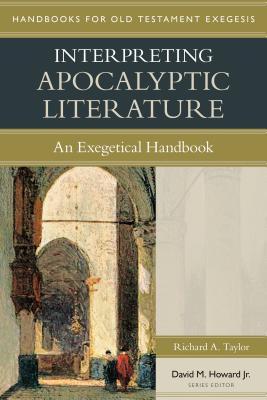 Richard A. Taylor is Senior Professor of Old Testament Studies and Director of the PhD program at Dallas Theological Seminary. Taylor received PhDs from Bob Jones University and the Catholic University of America and has published in both Bibliotheca Sacra and JETS. His previous publications include a commentary on Haggai in the New American Commentary series. Most recently, Taylor published an interpretive guide to the apocalyptic literature of the Old Testament in the widely praised Handbooks for Old Testament Exegesis series by Kregel Academic.
Richard A. Taylor is Senior Professor of Old Testament Studies and Director of the PhD program at Dallas Theological Seminary. Taylor received PhDs from Bob Jones University and the Catholic University of America and has published in both Bibliotheca Sacra and JETS. His previous publications include a commentary on Haggai in the New American Commentary series. Most recently, Taylor published an interpretive guide to the apocalyptic literature of the Old Testament in the widely praised Handbooks for Old Testament Exegesis series by Kregel Academic.
Interpreting Apocalyptic Literature: An Exegetical Handbook begins with a 20-page introduction to the genre of apocalyptic literature, including the distinctiveness of apocalyptic literature as a genre and various definitions related to the task of grasping apocalyptic literature in general. Taylor defines apocalyptic literature as “written expression of the emphasis that characterize apocalyptic communities, whether found in stand alone compositions known as apocalypses or in sections of material assimilated into other genres of literature” (p. 36). Taylor addresses the major themes in apocalyptic literature and covers a wide sample of representative text, including both biblical and extrabiblical material. Most of the book is spent equipping the reader with the tools for preparation, interpretation, and the proclamation of apocalyptic literature, specifically where such is discovered in the Old Testament. Lastly, Taylor offers a sample of his interpretive methods and uses Daniel and Joel as test cases.
There is much to be praised by Taylor’s work here. First, and probably foremost, the simple fact that he wrote the book is to be commended. Apocalyptic literature is a difficult genre that either gets mishandled or overlooked. Taylor has not only offered a framework for understanding this obscure genre, but he has made that framework exciting. Second, Taylor went beyond the canonical borders of the Old Testament and provided readers with a wider understanding of apocalyptic literature in general. Taylor demonstrates that the genre of apocalypses was both more widely used and better understood in the ancient world, and thus, guides the readers to that world as he surveys characteristics of related documents. Finally, the bibliographical material provided throughout the preparation, interpretation, and proclamation sections is invaluable. The keen reader wishing to build a useful library will harvest much from Taylor’s recommendations.
Interpreting Apocalyptic Literature: An Exegetical Handbook by Richard A. Taylor is a unique and important work. Taylor informs both mind and heart on how to do proper exegesis of this obscure genre. Students, pastors, and teachers struggling to provide contemporary relevance to the apocalyptic literature of the Old Testament will do well consulting this volume. It’s an essential exegetical resource that will become a standard for many years to come. It will be on a syllabus near you soon, so you might as well be proactive and get started now! Trust me. It will pay off dividends in no time!

Reblogged this on Talmidimblogging.